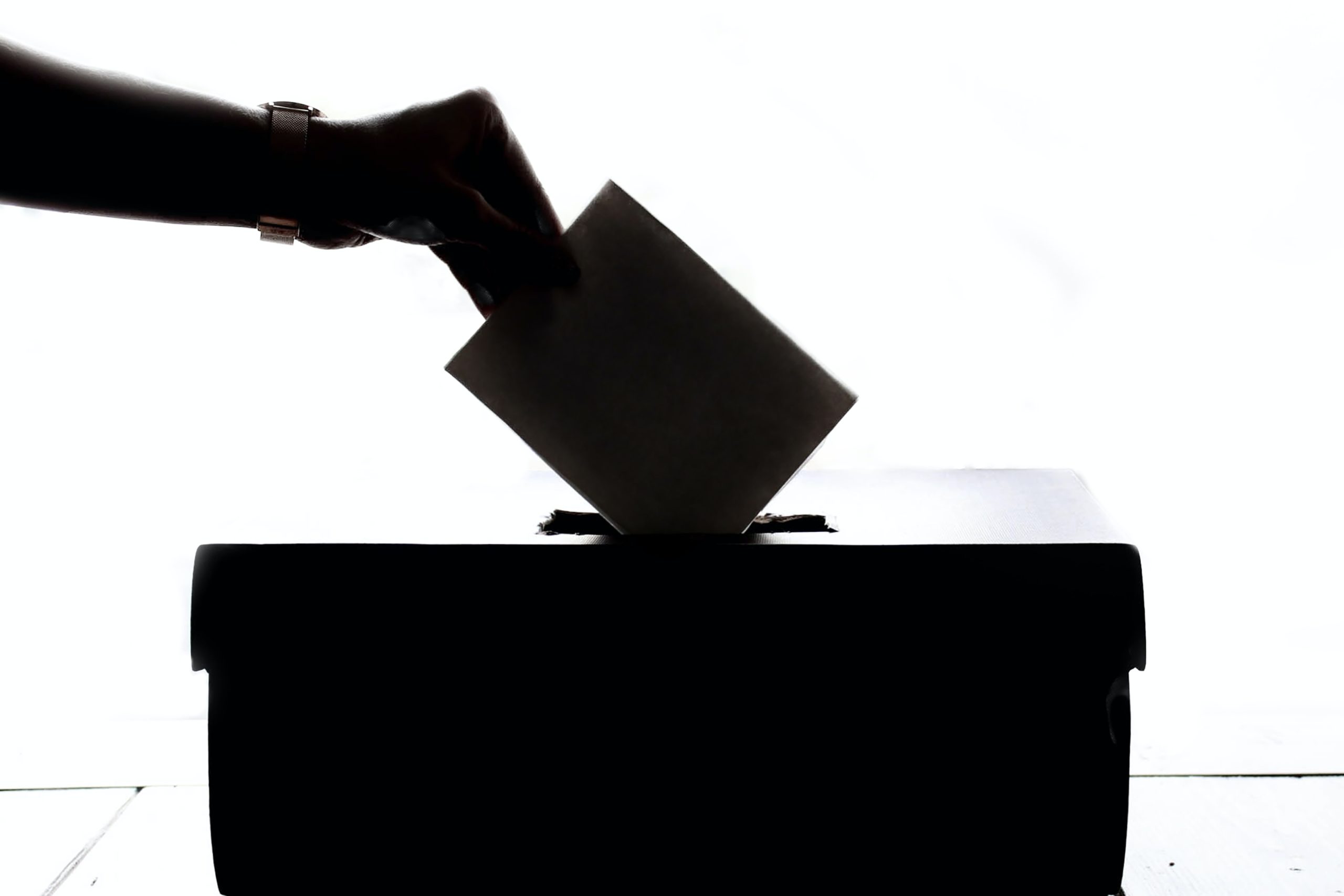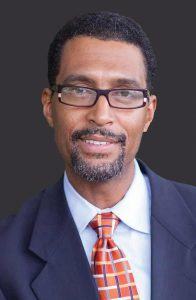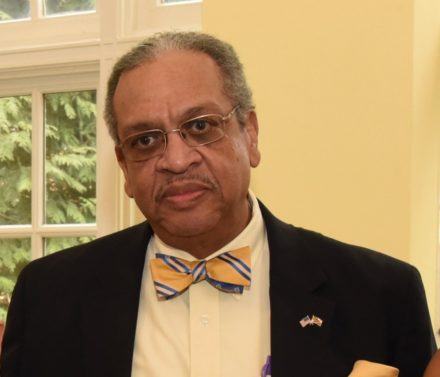Electing a President, Following a Savior

Thinking Biblically in an Election Season – By Dr. Kevin Smith
“And Jesus answering said unto them, ‘Render to Caesar the things that are Caesar’s, and to God the things that are God’s.’ And they marveled at Him.” Mark 12:17 (KJV)

Dr. Kevin Smith
Since the early 1600s, few historians of Christianity on the North American continent would consider professing Christians to be good examples of obedience to Jesus’ above-listed command. That’s almost 400 years to evaluate this area of ethical Christian thinking and acting. Certainly, this is no simplistic or trifling matter — the Scripture says even Jesus’ hearers “marveled” at what he commanded.
Whether one examines the Puritan Congregationalism of New England, the Anglicanism of the southern colonies, or the many movements that have arisen in the U.S., like Baptists, Methodism, Pentecostalism, the historic Black Church, mainline denominations influenced by the Social Gospel, the moral majority, or 20th-century seeker-sensitive megachurches, those who express a commitment to the lordship of Christ in their lives have not consistently obeyed (or even pursued) this command. Sadly, there are too many examples of Christians (individually or organizationally) disobeying Jesus’ command by rationalizing political expediency, giving religious “cover” to sinful governmental policies, or cowering in the face of a politician, party, or policy. May Christ’s Spirit fill His people in the U.S. to bear better fruit, for His glory!
The articles below are a seed of encouragement for MD/DE Baptists to think biblically and act as those filled with Christ’s Spirit as we engage this election season in our country. Our John 13:35 witness is too important to sacrifice for short-term political gains. Whether positioned as an Independent, Democrat, or Republican — may MD/DE Baptists find themselves manifesting the reality of a life that clearly declares to a watching community, city, and world that Jesus is Lord!
Why We Vote – by Faith Loudon
In less than a week, we will be voting for the people who will lead our country. What is our responsibility as Christians in this process? How do we, as Christians, vote? Where do we go for help as we decide which candidate to support? Do we get involved? Do we watch different news channels on TV or peruse social media to get political updates? Do we read popular blogs to learn what the candidates want us to know? The question is: how do we know what is true?
Our Founding Fathers wanted to create a nation like no other. They were educated men; they knew about the different methods of governing to date. Additionally, many of the Founding Fathers were men of God. They knew that if our nation was to grow and flourish, the people would need to depend on God. I truly believe they understood that God is sovereign over all (Daniel 2:21, 4:17).
Returning to where we are today as Christian citizens of the United States, should we vote? Absolutely! But how? Knowing and loving God should be our strength every day, and this relationship must be the foremost part of how and why Christians vote and who we choose. Our religious freedom is under attack and if we abstain from voting, which is a great privilege, we are essentially giving up our religious freedom.
Christians are probably the largest voting block in our nation. What we do and how we vote this year is extremely significant.
Please turn to the Bible, God’s Word, and seek God’s guidance as you vote. Have you ever considered riding up and down the highways and side roads and praying for the houses and the people in them as you pass them — praying that they will come to know Jesus and ask for God’s guidance as they vote? Have you ever felt God was calling you to run for public office? We need Christian leaders.
Let’s go back to some of those questions and the answers — God is the answer to all of them. We get the answer by being in God’s Word and a constant state of prayer for the answers we need.
Here are some Scriptures to read:
- Matthew 5:13 talks about being the salt of the earth.
- Exodus 18:21 tells us about selecting capable leaders.
- Philippians 4:6-7 reminds us to pray about everything.
- I Thessalonians 5:19 says to hold onto what is good.
Involvement in our culture means voting. It means getting involved in politics in a godly manner. It means getting involved with our schools. It means loving our neighbor.
Exercising Your Right to Vote — by Malcolm L. Funn
Whether we get our news online, in a newspaper, or by listening to the radio, we cannot help noticing that our nation is hurting:
- Spiritually
- Physically
- Morally
- Economically
- Through infection by the COVID-19 pandemic and the deaths of too many people.

Malcolm L. Funn serves as a Democratic representative for the Maryland Board of Elections and is a member of Bayside Baptist Church in Chesapeake Beach, Maryland.
Soon we will be preparing to vote in the presidential election on November 3 and it could be the most important election of our lives. If you are a Christ-follower, you cannot take this responsibility lightly. God is deeply involved in government, and so, as Christ-followers, we too should be involved. “God, Government and the Gospel,” David Platt’s 2020 Secret Church broadcast, told us that God calls leaders among His people to lead in ways that reflect His governance (Deuteronomy 17:14-20).
Deuteronomy emphasizes that leaders:
- Must hear and obey God’s word.
- Must avoid greed.
- Must avoid adultery.
- Must avoid idolatry.
- Must fear and submit to God’s authority.
- Must demonstrate humility before God and those they lead.
God establishes and controls earthly governments. “Let every person be subject to the governing authorities. For there is no authority except that which is from God, and those that exist have been instituted by God.” (Romans 13:1 (ESV)). Clearly, God is intimately involved in government. He established governments’ purposes, and He controls them under his sovereign rule (Proverbs 21:1, Daniel 2:21, 1 Timothy 2:1-3, John 19:11). As Christ-followers, we are subject to our government and bound to honor it, so we may live in peace, as stated in Romans 13 and 1 Timothy 2.
We cannot fall into Satan’s trap. Don’t let these be your words:
- “My vote doesn’t count. It’s only one vote.”
- “Politics and politicians are all corrupt, and as a Christian, I don’t want to be involved.”
- “I’m disappointed by the entire political process.”
- “I’m too busy to take the time to be informed, so I just don’t vote at all.”
These are some of the excuses people use to justify not exercising their civic responsibility to vote. As a Christ-follower, you are obligated to vote, and as an American, it is your duty to vote.
Who can vote?
Any American citizen over the age of 18, who is registered to vote, can do so. If you are not registered to vote, please register. Instructions are available on the Maryland State Board of Elections website at elections.maryland.gov.
When can I vote?
You can either vote in person during early voting or on Election Day. Alternatively, you can vote with a mail-in ballot.
Early voting will run from October 26 through November 2. Each early voting center will be open daily from 7 a.m. to 8 p.m.
On Election Day, you can vote at your county’s voting center or at the early voting centers. If you do not know where your polling place is, please visit the Maryland State Board of Elections website elect. Polling places will be open from 7 a.m. to 8 p.m. and anyone in line at 8 p.m. will be able to vote.
You may also vote by mail-in ballot, which may be the preferred method because of the COVID-19 pandemic. Maryland’s State Board of Elections website lists the instructions for this method.
Exercise your civic right and Christian duty to vote. Be obedient to your calling as a Christ-follower. I had and presently have relatives who were not able to vote until the enactment of the Voting Rights Act of 1965. Your right to vote is not only an obligation; it is your right as established by the U.S. Constitution. Thanks to the 15th and 19th Amendments, more of us have that right. Let’s exercise it and … VOTE!
Advancing Righteousness by Voting – by William Voelp
Often, as election season arrives, we ask ourselves, as Christians, what our roles and responsibilities are as it pertains to the political process. We are again closing in on November 3 and another opportunity to wield our authority, to love our neighbor, and to advance righteousness. I pray that this brief article will encourage you to vote, and when you vote, to vote your biblical values in this upcoming election.

Bill Voelp, who serves as a Republican representative for the Maryland Board of Elections, is a member of Severna Park Baptist Church in Maryland and also serves as president of the Baptist Foundation of Maryland/Delaware.
First, we have the blessing of living in the United States, where our founding is based on ultimate governmental power residing in the hands of the citizens. Our Constitution begins with “We the People.” God has ordained a unique system of governance whereby the government only has the authority given to it by those governed. While it is true that we are to yield to governmental authority so long as it is not in contrast to God’s commands, we are also to wield authority by voting and participating. It is then fitting that every Bible-believing Christian participate, at least by voting, in God’s ordained system, to instruct the government in uprightness.
Secondly, voting is an opportunity to live out part of our responsibility in Matthew 22:39, where Jesus commands us to “love your neighbor as yourself.” Voting our values tells our neighbors that we are committed to perpetuating the good life. “I am still confident of this; I will see the goodness of the Lord in the land of the living” (Psalm 27:13). While it is sure that the true goodness of the Lord is salvation, we must vote on the issues and for the candidates who live out Biblical principles in the community in which we live to promote the good life. By promoting the common good, we, as a peculiar people who live in righteousness, also witness to unbelievers.
Finally, we have an obligated to advance righteousness. If we do not vote for righteousness, we are complicit with the unrighteousness that may come forth. “When the righteous increase, the people rejoice, but when the wicked rule, the people groan.” (Proverbs 29:2). If you follow the Carpenter and have the righteousness that is His, you must vote for the candidate who will most likely further righteousness for this country.
In conclusion, our responsibility as a peculiar people is to wield the power bestowed upon us, to love our neighbors well, and to advance righteousness. This year, due to the complexities brought about by COVID-19, you will have multiple ways to vote. The best way to do so is to request a mail-in ballot and return that ballot in a timely way. In addition, there will be nine straight days of in-person voting, including eight days of early voting. In-person voting begins on October 26, with an increased number of vote centers on November 3.
Registered voters may vote at any early voting center near their residence. On Election Day, they may vote at Election Day vote centers. For details, visit elections.maryland.gov.
